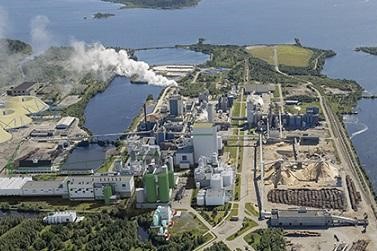 Metsä Group starts pre-engineering related to investments worth Euro 2 billion
Metsä Group starts pre-engineering related to investments worth Euro 2 billion
Metsä Group continues its strategy implementation by commencing pre-engineering projects related to building a new bioproduct mill in Kemi and a new sawmill in Rauma in Finland and to the first phase in renewing the Husum pulp mill in Sweden. If implemented in full the total value of these investments would amount to approximately Euro 2 billion during 2019–2023, as the company says in the press release received by Lesprom Network.
These planned investments in Kemi and Rauma would increase Finland’s annual income by approximately Euro 0.6 billion and exports by approximately Euro 0.7 billion, and the positive employment impact in the direct value chains would be roughly 2,000 jobs. Construction phases in Kemi and Rauma would generate a positive employment impact of approximately 11,500 person-years.
Building a new bioproduct mill in Kemi was chosen for future development. Target for the now initiated pre-engineering project is to create conditions for building a bioproduct mill with annual production capacity of approximately 1.5 million tonnes of softwood and hardwood pulp to Metsä Group’s current mill site in Kemi. In addition to pulp, the mill would produce various other bioproducts. This mill would be the biggest wood processing unit in the Northern hemisphere. The new mill would replace the current Kemi pulp mill which annual capacity is approximately 620,000 tonnes. The total investment would amount to approximately Euro 1.5 billion.
Annual pulpwood consumption of the new Kemi bioproduct mill would be approximately 7.6 million cubic meters, which is roughly 4.5 million cubic meters more compared to the consumption of the current mill. Pulpwood for the mill is targeted to be sources from Finland. Securing the wood sourcing for the mill requires further studies to maximize the share of domestic wood.
The Kemi bioproduct mill would directly employ approximately 250 people and in its whole direct value chain roughly 2,500 people in total, indicating an increase of 1,500 jobs compared to current situation. The employment impact in the construction phase would be almost 10,000 person-years of which over half in Kemi. The main planning premises of the new mill include totally fossil free operations and 250% self-sufficiency in electricity. The final investment decision related to Kemi bioproduct mill is expected to be made in summer 2020.
Metsä Fibre commences also a pre-engineering project to build a pine sawmill at its mill site in Rauma. The estimated annual production of the sawmill would be approximately 750,000 cubic meters. The new sawmill would be the most modern and efficient unit in its field in the world. The level of technology and utilization of data will be raised clearly higher compared to current sawmills. The total investment would amount to approximately Euro 200 million. The new sawmill would directly employ approximately 100 people and in its direct value chain roughly 500 people in total. The employment impact in the construction phase would be approximately 1,500 person-years. The sawmill’s annual sawlog consumption would be approximately 1.5 million cubic meters. Wood for the sawmill is planned to be sources from Finland. The increased sawn timber volumes would be sold mainly to European and Asian customers. The final investment decision related to Rauma sawmill is expected to be made in early 2020.
Metsä Board has concluded a prefeasibility study related to renewal of Husum integrate’s pulp mill in Sweden and starts pre-engineering of the first phase of the renewal. The plan is to build a new recovery boiler and a turbine to replace the mill’s old recovery boilers and turbines. This investment would amount to approximately Euro 300 million and it would be implemented during 2019–2022.
These planned investments implement Metsä Group’s strategic objectives by reducing the use of fossil fuels by over 400 GWh/a, increasing production of renewable energy by over 2 TWh/a and increasing carbon dioxide stored in wood products that have a long lifespan by 700,000 tonnes/a.
